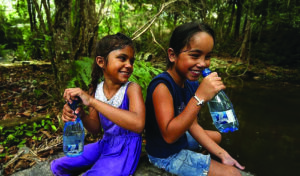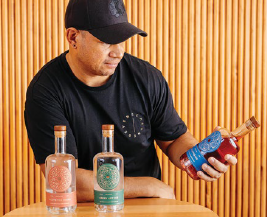Sustainability is deeply rooted in the culture of First Nations peoples, where the relationship with land and community is integral. In Australia, First Nations businesses are at the forefront of sustainable practices, drawing on their cultural values and knowledge to balance environmental protection with modern business needs.
The concept of “Caring for Country” drives their approach to sustainability. For First Nations peoples, land is not just a resource; it is a living entity that must be preserved for future generations. This cultural understanding translates into sustainable business practices, such as environmentally conscious harvesting, biodiversity protection, and ensuring
economic activities do not harm ecosystems.
Many First Nations businesses adopt community-centric models, focusing on both environmental and social sustainability. By involving communities in decision-making and sharing economic benefits, they create enterprises that
contribute to community wellbeing while preserving cultural traditions. This holistic approach reflects their commitment
to sustainability beyond just environmental factors.
In addition to traditional knowledge, First Nations businesses are embracing modern innovations. Some are using renewable energy, such as solar power, while others apply ancient land management techniques, like controlled burning, to manage ecosystems and reduce bushfire risks. These practices highlight the blend of ancient wisdom and modern
technology in their sustainable business models.
While these businesses face challenges, such as limited access to capital and complex regulations, they also have significant opportunities. The increasing demand for sustainable products and services positions First Nations businesses to expand their impact. Their cultural knowledge is increasingly valued in tackling global environmental
challenges, offering them a unique leadership role in sustainability efforts.
First Nations businesses in Australia showcase how sustainability is both a cultural responsibility and a modern business imperative. By integrating traditional and innovative practices, they contribute to environmental preservation and community wellbeing, providing valuable insights into building a sustainable future for all.
Yaru Water is a prime example of a First Nations business that embodies sustainable practices. Located in Northern New South Wales, Yaru Water is Australia’s original First Nations bottled water business, intrinsically tied to the land from which the water comes and where the bottling business is located.
From its inception, Yaru Water has prioritised environmental consciousness. The business began by offsetting its carbon footprint through credits but has since taken steps to improve its infrastructure and business practices to reduce its environmental impact. A key strategy has been bottling water at the source, which not only ensures the purity of the
product but also minimises the carbon emissions associated with transportation.
The natural mineral water flows from deep below the foothills of Mount Warning-Wollumbin, an ancient volcano, and is bottled directly at the source. The bottling facility also takes sustainability a step further by blowing bottles from recycled and recyclable PET, ensuring that the packaging is as eco-friendly as possible. Additionally, the factory is powered by a large solar project, further reducing its carbon footprint.
These efforts have not gone unnoticed. In 2023, Yaru Water’s bottling plant was awarded the Containers for Change Changemakers Sustainable Beverage Manufacturer of the Year award, a testament to its commitment to sustainability. By bottling at the source, utilising recyclable materials, improving transportation methods, and instituting a reforestation program, Yaru Water has significantly enhanced its environmental credentials.
Ngiilay & Seven Seasons: A Commitment to Sustainable Harvesting
Seven Seasons, named after the traditional seasonal calendar of the Larrakia people, is another First Nations business deeply committed to sustainability. This distillery produces premium spirits infused with native Australian ingredients, such as the Green Ant Gin available in Ngiilay gift boxes, Bush Apple Gin, and Native Yam Vodka.
The Larrakia people, the traditional custodians of the Darwin region, have practiced sustainable harvesting of ingredients for over 60,000 years. Traditional lore and generational knowledge determine when and what produce can be harvested, ensuring that nothing is taken before its time and that crops will be readily available for the next season.
Using this knowledge, Larrakia harvesters wildharvest more than three tonnes of native ingredients annually, including green ants, bush apples, yams, boobialla, strawberry gum, and pepper berry. This method of harvesting not only ensures the careful stewardship of the land but also provides sustainable employment for local First Nations people.
By adhering to these traditional practices, Seven Seasons is able to produce high-quality spirits while also contributing to the preservation of the environment and the promotion of cultural heritage. The business’s success proves that it is possible to create a profitable enterprise while staying true to the principles of sustainability and community support.



